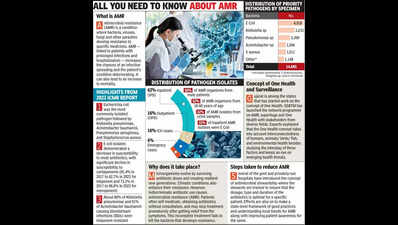Gujarat hospitals see worrying resistance to powerful antibiotics | Ahmedabad News - Times of India

SLUG: STATE's AMR PROFILE Ahmedabad: A recent govt study has revealed a worrying trend in Gujarat's hospitals — some of the most powerful antibiotics are no longer effective against common bacterial infections.The report found that more than 40% of E. coli and Klebsiella bacteria — two major antimicrobial-resistant (AMR) pathogens often responsible for serious infections — are now resistant to carbapenems, a high-end antibiotic typically used when all others fail.
This is one of the key findings of the surveillance report by the Gujarat State Antimicrobial Resistance Surveillance Network (GUJSAR), released on Wednesday.
The report analysed 14,685 AMR isolates collected between July 1 and December 31, 2024, from 22 network laboratories, including microbiology labs of six govt medical colleges, 13 GMERS medical colleges, and three municipal corporation-run medical colleges."While other drugs are still available — including colistin, the last resort for very severe bacterial infections — resistance to carbapenems signals that we are rapidly running out of feasible antibiotic options for serious infections.
Switching to a higher class of antibiotics also brings short-term and long-term side effects," said a senior city-based microbiologist.A senior state health department official told TOI that Gujarat is among the few Indian states with a dedicated AMR surveillance network. "All steps — from identifying antimicrobial resistance to specific antibiotics to reporting isolates — are standardized," the official said.T
he report focuses on priority pathogens, identified by the World Health Organization (WHO) as posing the highest threat to human health due to their resistance to existing antibiotics. The findings show that the majority of AMR isolates were from urine samples (42%), followed by pus aspirates (31%). About 62% of the isolates came from hospitalized patients, and 16% from patients in intensive care units (ICUs).Sources said that AMR organisms have been rising steadily — a trend also highlighted in Indian Council of Medical Research (ICMR) reports. "In recent years, gram-negative bacteria have shown increased resistance to several commonly used antibiotics. Some bacteria isolated from blood cultures also showed resistance, suggesting that if the correct antibiotics are not administered in time, it can lead to septicaemia — a potentially life-threatening bloodstream infection," said a microbiologist.








